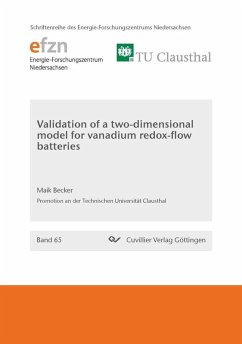Redox-Flow batteries can play a crucial role in the future electricity supply in order to balance the time lag between the generation of electrical energy from photovoltaics or wind power and the demand for electrical energy. However, to deploy the technology on a large scale, significant cost reductions are required. A thorough knowledge of the reactions and processes taking place within a redox-flow battery is very helpful for this task and this knowledge can be significantly improved by using a suitable mathematical model to describe the processes in a single cell of a redox-flow battery. Nevertheless, this requires a valid model that has been compared with experimental data and that can reproduce these data plausibly and validly.
In this thesis, the validation of a two-dimensional model for the description of potential and current density distributions in the porous electrodes of a vanadium redox-flow battery is presented, taking into account effects of kinetics and mass transport. Newly developed potential probes are used for in-situ measurement of solid and liquid phase potentials within a single cell of a vanadium redox-flow battery. The description of the measured cell voltage and potential probe signals by the model reveals a good congruence between the model and the experimental data, so the model can be regarded as valid. Additional suggestions for improvements of the model and the implementation of further models describing membrane crossover effects or electrolyte properties are given.
Dieser Download kann aus rechtlichen Gründen nur mit Rechnungsadresse in A, B, BG, CY, CZ, D, DK, EW, E, FIN, F, GR, HR, H, IRL, I, LT, L, LR, M, NL, PL, P, R, S, SLO, SK ausgeliefert werden.









